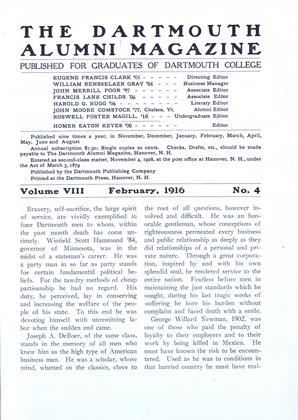Editor DARTMOUTH ALUMNI MAGAZINE:
I am in receipt of a letter from Dr. John B. Wheeler, of Burlington, Vt., referring to my "Story of Dartmouth." In this letter is a statement concerning the early days of the singing of "Amesbury" by the Dartmouth seniors, and as this throws light on an obscure custom, I believe it will be of interest to the College. Dr. Wheeler says:
"Although not a Dartmouth man, it is possible that I am in a position to add a trifle of information regarding one matter on which you seem to be somewhat in doubt. I refer to the custom of 'Singing the Seniors Out' with the hymn, 'Come, let us anew.' My grandfather. Rev. John Wheeler, Dartmouth 1816, was very fond of the hymn, and, although I was only nine years old when he died, I can remember his often having it sung at the 'family worship' of those devout days. My grandmother, who outlived him a long time, told me in after years that the reason of his fondness for the hymn was because it used to be sung when he was in College and was sung by his class at graduation. This, of course, is not very direct testimony, but it seems to establish at least the possibility that the custom existed a century ago, if not earlier than that."
Professor Lord, in his admirable history, puts the singing of "Amesbury" as certainly back of 1839, but doubts if there was any "sing-out" as early as the time of Professor Crosby. Perhaps not, in anything like present form; but Dr. Wheeler's letter makes it almost certain that old "Come, let us anew" has a century of usage as a graduation hymn.
Boston, December 16, 1915
Fort Barry, California, January 13, 1916
THE DARTMOUTH ALUMNI MAGAZINE, HANOVER, N. H.,
Dear Sirs:
In the number received today, I notice that the question of military instruction has been brought up, as I felt sure that it would be sooner or later.
I hope that means will be found by which Dartmouth students may obtain military instruction of such a nature that, in time of urgent need, they will be able to fill those positions of trust and responsibility to which their education and intelligence in other respects will call them.
In time of need it will be such men who will become officers, and if they acquire the first principles of military knowledge while in college, they will be many times more valuable to their country.
It need not materially interfere with other college instruction, and the knowledge and training obtained will be of great value to each and every man in after life, even if he never again thinks of it from a military standpoint. He will be physically the better because of it.
It will not, as some seem to fear, develop any undesirable results in the way of creating too much of a military spirit, for the present day military instruction is by no means play and there is plenty of opportunity for the exercise of both the mental and the physical sides of the man.
There is, at present, in this country, too much evidence of hysteria, and too much tendency to assume that no nation will ever interfere with us if we do not attack them first. They forget that commercial interference is most frequently the real cause of war, and that, in that very particular, we are right now striving to get trade away from other nations, and are thus laying the foundation "for trouble. We do not need a large army but we do need to train those who will be the officers of a larger army, in the elements of military knowledge.
I hope that Dartmouth will not fall behind others in doing her part in this work and I feel sure that she will not,
Sincerely,
1st Lieut., M.R.C.
 View Full Issue
View Full Issue
More From This Issue
-
 Article
ArticleDARTMOUTH SECRETARIES ASSOCIATION
February 1916 -
 Article
ArticleRICHARD NELVILLE HALL '15
February 1916 -
 Class Notes
Class NotesCLASS OF 1884
February 1916 -
 Article
ArticleDARTMOUTH AND THE SECONDARY SCHOOLS
February 1916 By James L. McConanghy -
 Class Notes
Class NotesLOCAL ASSOCIATIONS
February 1916 -
 Class Notes
Class NotesCLASS OF 1861
February 1916
Letters to the Editor
-
 Letters to the Editor
Letters to the EditorGRADUATES OF MIDDLE EIGHTIES MAY HELP PROF. McCALLUM
June 1925 -
 Letters to the Editor
Letters to the EditorCornell Game Pow Wow
April 1938 -
 Letters to the Editor
Letters to the EditorLetters
February 1953 -
 Letters to the Editor
Letters to the EditorLetters
October 1956 -
 Letters to the Editor
Letters to the EditorLETTERS
APRIL 1959 -
 Letters to the Editor
Letters to the Editorreaders react
NOVEMBER | DECEMBER 2015


